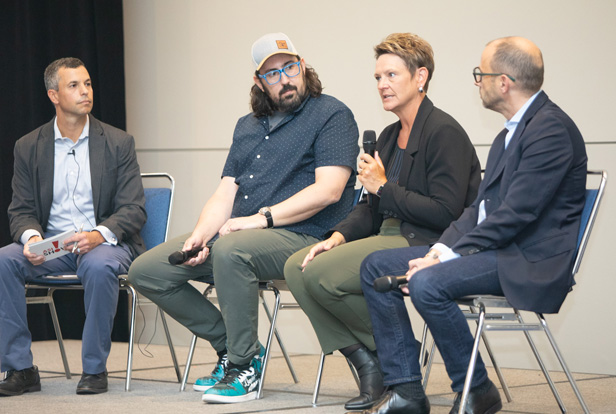Strategy July 23, 2025
ASI Chicago 2025: Counselor’s Advisory Board Shares Growth Strategies
A trio of distributor leaders gave tips on sales and marketing tactics along with views on AI and how to navigate tariffs.
Key Takeaways
• Targeting high-value clients like Fortune 500 companies requires mastering the RFP process and tailoring communication to specific industries. Building strong relationships is crucial — clients want solutions, not just products.
• Embracing AI and integrated tech stacks (like ERP and CRM systems) can significantly streamline operations. Prioritizing infrastructure and automation help scale without overwhelming teams.
• Hiring for cultural fit is essential, especially in virtual environments. Additionally, being proactive and transparent with clients — especially around challenges like tariffs — builds trust and resilience.
At the ASI Show Chicago, attendees gathered to hear front-line insights from a trio of distributor leaders who have positioned their companies for success. The session, titled “Expert Business-Growth Strategies From Counselor’s Advisory Board” offered practical, experience-based advice covering ever-green topics like sales and operations, as well as hot-button issues such as tariffs and AI.

The ASI Show Chicago educational session “Expert Business-Growth Strategies From Counselor’s Advisory Board” featured (from left to right) Counselor Editor-in-Chief C.J. Mittica; Bryan Goltzman of Liquid Screen Design (asi/254663); Lisa Hubbard of The Vernon Company (asi/351700); and Charles Dolige of LR Paris (asi/246857).
The session, moderated by Counselor Editor-in-Chief C.J. Mittica, featured three members of the magazine’s advisory board: Lisa Hubbard, a Counselor Power 50 member and VP of sales & marketing for Counselor Top 40 distributor The Vernon Company (asi/351700); Bryan Goltzman, owner of Counselor Best Place to Work company Liquid Screen Design (asi/254663); and Charles Dolige, partner at LR Paris (asi/246857).
Read on for their top takeaways and advice.
Sales
If you want to aim big for prospects such as Fortune 500 or 100 companies, then you’ll need to get familiar with three letters: RFP (Request for Proposal). These documents, which outline the needs of a client when bidding out a project, have been increasingly commonplace and onerous.
“The RFP process has really changed, even since I’ve joined Vernon five years ago,” said Hubbard. “We’ve seen an intense amount of requirements in the information security space. We just worked on an RFP that literally had 30 pages of IT requirements.”
Liquid Screen Design works with household names but also “the local dry cleaner down the street” said Goltzman. No matter who it is, “often what we find, especially working with high-value clients, is the relationship piece is so important. They want to feel that we’re not selling them a product – we’re selling them solutions.”
In terms of the types of clients worth targeting, all three panelists suggested identifying the verticals or size of clients you want to go after, and make sure you’re using the language that speaks to buyers in those industries.
Marketing
LR Paris has been growing rapidly, but the unique part, Dolige revealed, is that the company has only just started to truly market their business. Up to this point, “for us, it’s been word of mouth,” he said. “That’s the best marketing we’ve ever used.”
Goltzman espoused the use of creative self-promos, as well as his intentions to use spec samples based on intel he heard earlier in Education Day that 25% of such samples convert to sales.
Hubbard urged attendees to understand the rules and regulations around marketing. “The whole spray-and-pray days of marketing are over because consumers won’t stand for it,” she said.
Operations
Technology is playing a huge role in streamlining operations and promoting efficiency. Goltzman, a huge AI proponent, was able to transition 25% of the Liquid Screen Design team’s basic functioning to executive functioning through AI automation, including using a program that pre-drafts email responses. Using AI today, he said, “is like having a website in the ’90s,” and all the advantages that come with being an early adopter.
Hubbard, too, endorsed the idea of having a robust technology stack that integrates things like an ERP (Enterprise Resource Planning), a CRM (Customer Relationship Management) and lead gen software. She remembers joining Vernon, and steering the conversation away from growing the business (which would have overburden the operations team) to pivoting to promoting efficiency. “We needed to figure out,” she said, “how to build a better infrastructure that would take some of those steps and those touches out of it.”
Hiring
All three panelists agreed that cultural fit for new hires is paramount. At LR Paris, Dolige typically handles the last interview of job candidates. “For me, the most important point is culture,” he said. “I want to make sure that whoever joins our company can work well with our team.”
Liquid Screen Design is a fully virtual company, which opens up the possibilities for the distributor when it comes to hiring. “It’s not about who can drive to my office,” said Goltzman. “I want the best person, wherever they are in the world.” The company uses DISC assessments to determine how people will work and how they can fit in. “What I tell people,” Goltzman added, “is that it doesn’t matter if you know how to do to the work if you’re not a cultural fit.”
Tariffs
The promo industry declined by 3.2% in Q2 this year (the second straight quarter that industry sales declined), and tariffs have assuredly had a major impact. All three panelists said their companies had emerged relatively unscathed, but it was and remains vitally important to keep customers in the know about how pricing, orders and other key details are being affected. “Be proactive and communicate with your customers,” Hubbard advised. “Transparency is key.”
